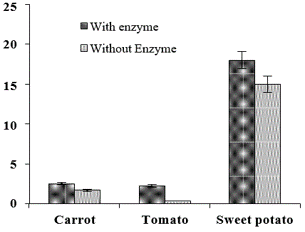Abstract
Macerating enzymes breaks long chain compounds during maceration for extraction of industrially important phytomolecules. Cellulase is an important class of enzyme which helps in the extraction process of phytomolecules such as carotenoids, camptothecin from their natural sources as macerating enzyme. The extraction of phytoconstituents like carotenoids, camptothecin holds high commercial value. The uses of macerating enzymes help to the extraction process of phytomolecules and increase its yield. Quality of the product is also improved in terms of stability, texture and viscosity. Camptothecin is an important drug with potential anti-cancer activity. In this work, the effect of cellulase on the extraction of carotenoid from carrot, tomato and sweet potato have been studied. As a pioneer work, the production of camptothecin from endophytic fungi Aspergillus niger has been carried out using cellulase. The quantitative analysis of pharmaceutical important phytomolecules such as carotenoids and camptothecin were performed using UV-Visible spectrophotometer, HPLC with respective standard compounds. Carotenoid extraction was made from tomato, carrot and sweet potato with cellulose enzyme found 2.5±0.25µg/g, 2.2 ±0.18µg/g, 18± 1.75 µg/g respectively. Carotenoid extracted from carrot using enzyme yielded 1.47 times higher amount of carotenoid than that of without enzyme. Carotenoid extracted from tomato, showed the maximum difference of being 7.3 times higher with enzyme than without enzyme. The another industrially important phytomolecule camptothecin extraction was made from Aspergillus niger with cellulase enzyme yielded 0.5512 mg/g which is more than the camptothecin, extracted without enzyme (0.175 mg/g). Thus, it was observed that the use of cellulase enhanced the yield of both carotenoid and camptothecin from natural sources such as plants and fungi.
Full text article
Authors

This work is licensed under a Creative Commons Attribution-NonCommercial-NoDerivatives 4.0 International License.

